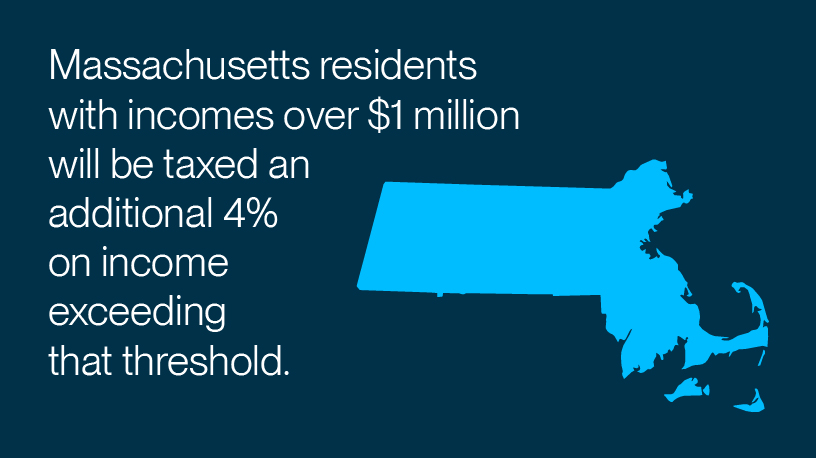As of 2023 Massachusetts residents with incomes over $1 million will be taxed an additional 4% on income exceeding the threshold. Read our mitigation strategies.
Key takeaways:
-
In 2023, Massachusetts residents with incomes over $1 million will be taxed an additional 4% on the portion of annual income that exceeds $1 million.
-
This new tax will apply to earned income as well as long-term capital gains that exceed $1 million in a single year such as the proceeds from the sale of a business or vacation home.
-
With the passing of this legislation, it may be advantageous to move certain assets into trusts that reside in more tax-favorable states such as Delaware and Nevada.

Millionaires Tax – defined
Early in November 2022, the Millionaires Tax legislation was approved by Massachusetts voters. Starting in 2023, Massachusetts residents with incomes over $1 million will be taxed an additional 4% on the portion over the $1 million threshold. Because Massachusetts has a flat tax, this additional surtax applies to earned income as well as long-term capital gains, which is currently taxed at 5%.
In addition, the threshold for this surtax will increase with inflation each year. Short-term capital gains will continue to be taxed at 12%. For example, if an individual earns $2 million in one year, the first million is taxed at 5% and the second million is taxed at 9%.
Millionaires Tax – impact
If you are a resident of Massachusetts and earn more than $1 million either through salary and/or investments, beginning in 2023 you will be impacted by the new tax rates. Additionally, there are one-time occurrences such as the selling of a business or a vacation home which may place you over the $1 million income threshold for a particular year.
Related read: 10 Practical tactics that can help reduce your tax bill
Millionaires Tax – founder & executive tax mitigation strategies
After the passing of this legislation, Massachusetts will have one of the highest state income tax rates. For Massachusetts residents, this creates additional planning considerations and opportunities for moving assets into one of several types of trusts that reside in more tax favorable states, such as Delaware and Nevada.
Below is an overview of the types of trusts that may offer significant tax advantages given the new circumstances in Massachusetts. References to “complete” and “incomplete” transfers are noted in the trust types noted in the reminder of this article. Those two terms are defined as follows:
-
-
Incomplete – A gift that the grantor maintains some control over the gift and its use.
-
Complete – A gift that the grantor relinquishes all control of the gift and its use.
-
-
Incomplete gift non-grantor trust (ING Trust) – An irrevocable trust in which transfers to the trust are incomplete for gift tax purposes but complete for income tax purposes.
-
Non-grantor gift trust for descendants – An irrevocable trust in which transfers to the trust are complete for gift tax and income tax purposes. These trusts would be set up in a state that has no state fiduciary income tax.
-
Non-grantor gift trust for spouse and descendants – An irrevocable trust in which transfers to the trust are complete for gift and income tax purposes. This is sometimes referred to as a SLANT (Spousal Lifetime Access Non-Grantor Trust). To make this type of trust a non-grantor trust, an adverse party is required to approve distributions to beneficiaries.
-
Non-grantor gift trust for settlor, settlor’s spouse and descendants – An irrevocable trust in which transfer to the trust are complete for gift and income tax purposes. To make this trust a non-grant trust, an adverse party is required to approve distributions to beneficiaries. This form of trust must qualify as a Domestic Asset Protection Trust and should be set up in a state that has a Domestic Asset Protection Trust statute.
Related read: Our top year-end tax strategies for investors and entrepreneurs
Millionaires Tax – example tax mitigation scenarios
Here are a few scenarios that illustrate the tax strategies used to reduce Massachusetts state tax expenses with the new legislation in place. The examples below are fictitious and meant to provide clarity to business owners and investors who may find themselves over the $1 million threshold during a particular year.
-
Client one strategy – Jeff and Sarah are married Massachusetts residents who make a combined annual income of $500,000. Jeff owns 250,000 shares of his company and the company plans to IPO during the next year. Once the company IPOs, the anticipated fair market value (FMV) of the shares will be $30 per share. If Jeff sells all the shares at $30, his earned income plus the $500,000 proceeds from the shares would be taxed at Massachusetts ordinary income rate, while the remaining $7,000,000 would be taxed at Massachusetts ordinary income rate plus the surtax rate. In this instance, Jeff and Sarah should consider gifting some shares ahead of the liquidity event into a trust domiciled in a more favorable state such as Delaware or Nevada.
-
Client two strategy – Eric has 55% ownership in the company he co-founded with a friend. They are selling the business next year. Eric’s ownership is valued at $2,000,000. If Eric transfers 100% of his ownership into an ING or a Completed Gift Non-Grantor Trust in a state with zero income tax, the sale of the business will not be taxed in Massachusetts. Another strategy to consider is structuring the sale in installments over several years to avoid proceeds being taxed at the surtax rate.
-
Client three strategy – Andrew, a General Partner at a private equity firm, receives carried interest from his company funds. His company plans on raising additional funds in the future. To potentially avoid the Massachusetts surtax, Andrew may want to consider transferring partial ownership of the additional carried interest into an ING or Completed Gift Non-Grantor Trust domiciled in a more favorable state. By doing so, the distributions being paid from the funds will avoid taxation in Massachusetts.
For more information regarding the Massachusetts Millionaires Tax, effective trust planning and additional tax strategies, please reach out to your SVB Private Fiduciary Advisor.


